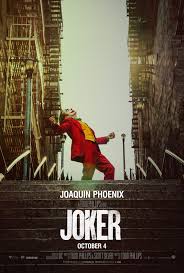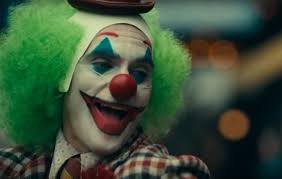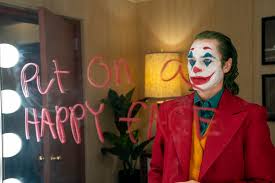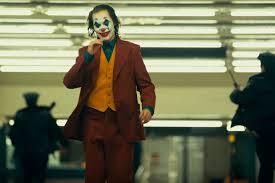
Man, Joker is an intense movie. Everything about Director Todd Phillips’ origin story for the iconic villain is intense, from the incredible performance by Joaquin Phoenix to the excellent story, which feels more like a Scorsese mash-up than a DC popcorn movie. It’s interesting. I can see several variations on how this could have been pitched. When I first started seeing trailers for it, I thought perhaps someone pitched a psychopath movie, and the executives at Warner Bros decided to replace whoever was going to be the main character with the Joker in order tap into the built in DC/comic book audience and give it some crossover appeal that would portend a better chance at success at the box office. Another more plausible scenario for a possible pitch was someone pitching a remake of The King of Comedy, but that same executive stating accurately that no one gives a shit about The King of Comedy, but substituting the Joker for Rupert Pupkin would deliver that built in DC/comic book audience and that built in Scorsese/cinemaphile audience that would portend some crossover appeal and perhaps open up the possibility of it being Oscar-bait.
Well, whoever came up with that idea is a flat-out genius because that’s what we got.
We got The King of Comedy meets Taxi Driver with just a splash of Batman. When it comes to comic book/super-hero movies, Joker is much more similar to Logan that it is to really any other films of that budding genre. It has no resemblance whatsoever to the cookie-cutter, quarter pounder with cheese films that Marvel has been serving up for the past decade. It bears even less resemblance to the tripe that Warner Bros and DC have been putting out in a vain attempt to tap into that Marvel market. No one has super powers in this movie. No one is fighting for truth, justice and the American way. This is a movie about a small, mentally unstable man who finally gets sick of being stepped on, and through either reality or fantasy, realizes that his only true joy is in creating anarchy.
In The King of Comedy, Rupert Pupkin played sublimely by Robert De Niro, is obsessed with the Johnny Carson-like TV host Jerry Langford (Jerry Lewis), and he’s built a fantasy that he’ll one day appear on his show and become friends with him. Rupert dreams of being a standup comic even though he’s never performed in front of an audience in his life, and he eventually kidnaps Jerry as a means of getting on to his show. Directed by Martin Scorsese, it never reaches the kind of darkness that Taxi Driver achieved, but it takes a satirical and poignant look at the desire for fame as well as fame’s price.
Taxi Driver, on the other hand, and also directed by Scorsese and also starring De Niro, takes a probing look at the underbelly of New York City in the 1970’s and the cesspool of depravity that it had become. It also takes a probing look at how lonely people like Travis Bickle (De Niro) can get, even when they’re surrounded by millions of people, and how that loneliness can manifest itself in unhealthy and self-destructive ways.

In Joker, Phillips took both of these ideas and mashed them together. Arthur Fleck (Phoenix) isn’t as obsessed with Johnny Carson-like TV host Murray Franklin (De Niro) as Rupert Pupkin was with Jerry Langford, and he’s not interested in becoming a vigilante in order to save a young prostitute like Travis Bickle. He’s just a lonely, disturbed man who is getting no help in this world. The super-rich like Thomas Wayne care nothing for his plight, and the government is too ineffectual in every aspect of its existence to be able to make a difference in Arthur’s life. Combine that with a mentally and physically disabled mother that he has to take care of, and you have the recipe for a man who is about to snap.

The screenplay for Joker is impressive.
There was a lot to like about this movie, but I want to take a moment to discuss the script, penned by Phillips and Scott Silver. For the most part, this was a supremely well-written screenplay. It actually hit many of the same beats as The King of Comedy, but the story was structured in a different way. There were actually four acts in this script as we slowly watch Arthur Fleck devolve into the Joker. The first act shows Arthur’s Ordinary World of struggling to keep his own mental health together while also struggling to hold on to his job as a clown, and also struggling to care for his ailing mother. In the second act he’s been fired from his job, and then commits his first murder. Actually, murders. He’s starting to realize that he doesn’t just have to roll over and that he has the power to fight back. He starts out the third act by believing that he’s learned the truth about something, but then finding out the complete opposite and he comes to the devastating conclusion that his whole life has been a lie and that he’s never been happy for one second of it. The fourth act and climax of the film shows that he can find happiness, but it’s only in creating anarchy, and the more disorderly and deadly a situation becomes, the happier and more satisfied he is. This is an exceptional script as the character arc and the dramatic arc of the plot move together hand in hand. It also has long stretches with little to no dialogue, demonstrating that Phillips and Silver were able to show rather than to tell.
Joaquin Phoenix is one of the great actors of this generation.
I would also be remiss if I did not mention the performance of Joaquin Phoenix. He’s always had a dark edge to him, whether he’s playing Theodore in Her or Commodus in Gladiator or Johnny Cash in Walk the Line, Phoenix excels at playing characters with inner demons that they’re trying to suppress, either consciously or subconsciously. As Arthur Fleck, Phoenix plays a man who fully understands that he has demons and discovers that he feel better when he lets them out. He spends the first three quarters of the movie suppressing them, and it’s as though he’s living in a prison of his own making with walls built of the medication that he takes. It’s only after he allows himself to be free that we see him truly happy. Of course, this is as a murderous, anarchistic psychopath, but hey, he’s happy.

The sheer intensity that Phoenix brings to the role is palpable. It doesn’t matter if he’s laughing for no reason, dancing down stairs to music that only he hears, or killing would-be attackers in the subway, Joaquin Phoenix delivers in Joker in a way that is certain to get him noticed come awards season.
There is one last point I’d like to make and that is my personal opinion about the direction that Warner Bros should take the DC universe. Warners and DC should forget about competing with Marvel. Marvel has that audience wrapped up. That audience is faithful, loyal and utterly devoted. Marvel movies are polished, generic and vanilla so that they appeal to the lowest common denominator and they cast the widest possible net. There isn’t anything wrong with that. Marvel movies make boat loads of money every time out and will likely continue to do so into the future.
But Warner Bros has always been at their best when they’ve been subversive. When Walt Disney was producing Mickey Mouse and Donald Duck and Goofy cartoons, Warner Bros was producing Bugs Bunny, Daffy Duck and Porky Pig. Disney cartoons were fun, wholesome, family fair and Warner Bros cartoons were violent, edgy and rebellious. Warner Bros was the original home of the Gangster Movie with stars like Humphrey Bogart and James Cagney providing early tent polls for the studio. Warner Bros has always been the edgy and gritty studio that makes hard boiled movies that are as tough as five-dollar steaks. Joker is a very fine example of that attitude and style of film making, and I believe that Warner Bros should go all-in on it. They should consider moving their cinematic comic book universe into an area that Marvel couldn’t go into even if they wanted to. Perhaps it wouldn’t be casting as wide of a net, but it would be a whole lot better than what they’ve been doing up to this point. It also might attract real film makers who are interested in deeper stories and deeper examinations and explorations of the psyches of their characters. I’d be willing to bet that they’d find an audience that, while perhaps not as large as the Marvel audience, would be no less loyal.